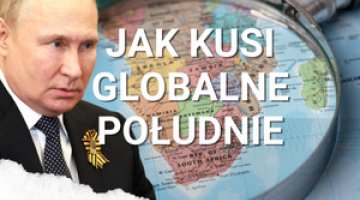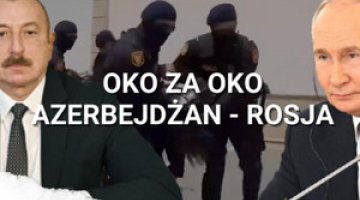An old Putin for new times – the Russian prime minister’s electoral agenda
The key position in the Russian state will be taken by a politician whose vision of the state and the politico-economic agenda have remained unchanged regardless of the evolution Russia has seen over the past few years, especially in the social sphere. His agenda is lacking modernisation stimuli that would boost the development of the Russian economy, and its competitiveness on global markets may continue to fall. Moreover, Putin does not offer anything to the increasing group of citizens who are interested in adjusting the state model to make it more liberal. Putin intends to rely on his traditional electorate, who are interested in stability, but he will be unable to keep the generous social promises he has made to them. This may lead to a further erosion of public support for Putin and make socio-political instability more likely in Russia.
Russia according to Putin’s vision: a strong, sovereign state
Since mid-December, Putin has been publishing weekly articles in the Russian press, thus presenting his electoral agenda concerning politics, social affairs, the economy, and security. These texts reveal a vision of the state which is not a liberal one, even on the level of rhetoric. Judging from Putin’s declarations, he is planning to continue the policy he adopted during his second term as president, when economic reforms were put on hold, and instead the process of acquiring property by the elite linked to Putin gained momentum. The state according to Vladimir Putin should be strong, centralised and resistant to external interference and Western political and economic solutions. He is arguing that building democracy is a slow process, and Russian society must become mature enough for it. One of Putin’s priorities is to maintain political stability, the alternative of which is the model of ‘oligarchy and anarchy’ as was seen in Russia in the 1990s. Putin’s proposals of a democratic nature (for example, that parliament should consider citizen’s initiatives which are backed with 100,000 signatures on the Internet) are of marginal significance in his agenda and – even if put into effect – will not change the balance of powers in the system of government.
A strong state would also play a dominant role in economic processes; Putin in this context makes references to the Chinese and South Korean models. A state like this is to stimulate technological modernisation, one of the driving forces of which will be the arms industry. Putin is defending the statist economic policy which has been in place for the past decade, including the creation of state-controlled corporations to boost economic growth. Although Putin admits that the economic model based on raw materials is no longer functional, he fails to propose any structural reforms, and instead suggests only a slight adjustment resulting from budget needs (limited privatisation).
Putin is outlining a vision of a welfare state, thus making promises of generous social benefits to the less prosperous citizens (Putin’s most faithful electorate). He also presents a vision of a multinational state, however, with the Russian language and culture playing the dominant role. Putin is also drawing attention to spiritual values by emphasising the role of the religions considered traditional in Russia (Orthodoxy, Islam, Judaism and Buddhism). He is making cautious steps on the unsteady ground of national rhetoric. On the one hand, he is trying to respond to the popular anti-immigrant sentiments by promising to introduce stricter requirements for immigrants. On the other hand, he is warning against fomenting ethnic conflicts in fear of an uncontrolled increase in tension and because he is aware of the fact that the Russian labour market will need more and more new workers from the CIS area.
Putin’s agenda statements are one of the elements of his electoral campaign which is aimed at creating his image as the only true leader capable of coping with the challenges Russia is facing. The central motif in Putin’s addresses is the argument that it was him who managed to steer Russia out of the economic collapse after the 1990s, and he still remains the only candidate to have a constructive agenda for the future. During this campaign, Putin and his aides have also been emphasising that his accomplishments grant him a status incomparable to any other presidential candidate; he refused to take part in pre-election debates along with the other candidates, he is clearly favoured by the media, etc.
Direction of action: preservation of the status quo
A large part of the declarations made by Vladimir Putin (especially the social ones) are of a populist nature and are unrealistic given the possibilities of the state finances. His promises of combating such system-inherent problems as corruption or the politicisation of the economy should also be treated with due caution, since this would be contrary to the previous practice and the interests of the ruling class. However, a number of points Putin made can be seen as harbingers of his policy after his expected electoral victory. Additional prognostics for the policy to be adopted by Putin are his actions and statements during the election campaign, and – above all – an assessment of the interests of the elite linked to Putin in the changing internal political situation.
Putin’s priorities will include him reinforcing his political position; this has been weakened by public protests and what appears to be the seeds of ferment in the state administration. However, nothing seems to indicate that he will try to defuse this frustration by fulfilling at least part of the demands made by those discontented, starting with such concrete measures as the dismissal of Vladimir Churov, the head of the central electoral commission, and extending to demands concerning systemic changes (for example, reducing the dominant role of the state in the economy). Putin is much more likely to tighten the grip on power and try to maintain the ‘stability’ he has promised. In this context, repressive actions may be taken in order to discourage citizens from actively demonstrating their dissatisfaction and help the Kremlin keep control of socio-political activity. Actions aimed at discrediting opposition leaders have already been taken, and pressure is being put on the independent media (Ekho Moskvy radio, Novaya Gazeta weekly, and the Dozhd television channel). The scope of the previously proposed democratic changes, such as facilitations in the establishment of new political parties or direct elections of the heads of the Russian regions, is also being restricted (for more on this issue see ‘An apparent liberalisation: the Russian government responds to the protests’).
A great part of Putin’s economic statements also seem unrealistic, such as his ambitious declarations of technological modernisation. However, their general overtone confirms that he will continue the statist economic policy wherein the state will control and dispose of the reserves, initiate development routes and control private initiative. The driving force of this development model will still be the large state-owned (or state-controlled) entities managed by Vladimir Putin’s trusted colleagues. The prime minister’s statements also indicate that the government’s attitude to foreign capital has not changed; it sees Western investments and technologies as something the Russian economy needs, but at the same time fears that excessive opening up to investors will reduce the ruling elite’s control of the strategic sectors. Due to the lack of structural changes the Russian economy will continue to be dependent on the market situation, politicised, centralised, and subject to market fluctuations and the private interests of people linked to the government elite. For instance, the market situation may force the government to make socially painful decisions, contrary to the present declarations, such as social spending cuts or the reduction of the budgets of prestige-building initiatives (for example, the Sochi Olympics).
Victory. And then what?
Vladimir Putin is going to win the election on 4 March without a shadow of a doubt. However, he may face numerous challenges in the coming years. These challenges may arise due to the fact that the presidency will be taken by a politician who, despite the great internal political and social changes which have taken place in Russia, is offering an agenda unchanged for a decade. Putin intends to rely mainly on his most faithful electorate – citizens who show little political activity, are dependent on state support and remember the hardships of the 1990s – by offering them a vision of stability and promises to raise social benefits. Meanwhile, he has no offer to this part of society who are interested in reforming the state model, including relaxing the government’s control of the economy and socio-political activity. For this reason, Putin’s political model and the aspirations of active social groups interested in modifying the state model are likely to clash.
At the same time, even an economic boom will not be enough to fulfil the generous social promises Putin has made to his traditional electorate (which may undermine support for him), nor will it enable the implementation of his ambitious announcements of technological modernisation. This may cause a further deterioration in Russia’s competitiveness on foreign markets, for example, on raw material markets, where LNG, unconventional gas and renewable energy are playing an increasing role. Russia’s financial reserves, which are necessary to maintain the stability promised by Putin, may thus turn out insufficient, and a further erosion of public support will add to the increasing likelihood of socio-political instability.
Jadwiga Rogoża
Additional research by: Iwona Wiśniewska, Katarzyna Jarzyńska





